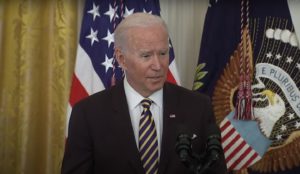Judge orders Olathe school board to pay $259K legal fees for plaintiff in First Amendment case
(The Sentinel) – Federal District Court Judge Holly Teeter on April 4 ordered the Olathe school board to pay Jennifer Gilmore’s attorney, Linus Baker, $259,233 in attorney’s fees —…

(The Sentinel) – Federal District Court Judge Holly Teeter on April 4 ordered the Olathe school board to pay Jennifer Gilmore’s attorney, Linus Baker, $259,233 in attorney’s fees — bringing the total cost to taxpayers to more than $700,000.
Gilmore had sued in federal district court after she was thrown out of an Olathe Board of Education meeting in 2022 for political comments board members found offensive.
Baker said in a phone interview on April 17, 2024, that his estimate was that the board of education had spent some $470,000 defending the case — a number that is quite close to the amount reported by the Olathe Reporter of $472,327.
“So the whole thing was to pay the dollar, admit you’re wrong, just apologize,” Baker said. “The majority of the board said ‘no, we want to make Jennifer an example. We’re never going to pay anything to her.’
“So that’s what they did, and two years later, they’ve spent $731,000 to avoid paying $1 and saying they’re sorry.”
In late 2023, the Kansas City Star reported that after a four-day trial, a jury found that her First Amendment rights were violated when she was prevented from speaking during the meeting when then-president of the board Joe Beveridge disliked her views.
The jury awarded Gilmore $1 in nominal damages, acknowledging her 1st Amendment rights had been violated and that Beveridge and others on the board had engaged in “viewpoint discrimination.” The jury did not find cause for punitive damages, and United States District Judge Holly Teeter had already thrown out most of Gilmore’s claims by denying — in part — a request for summary judgment.
Teeter dismissed the claims against the board and the district and also dismissed — as moot — Gilmore’s claim against the revised policy for lack of standing, as it was not in force at the time Gilmore was removed from the meeting.
However, Teeter let Gilmore’s primary claim stand, saying a jury could reasonably conclude that her First Amendment rights had been violated because she had been blocked from speaking because of her views.
Teeter had also said in court documents a reasonable jury might conclude Beveridge “acted in anger” because of Gilmore’s criticism of his father-in-law rather than because of board policy.
Teeter made some minor reductions to Baker’s bill but dismissed claims by the district that the bill should be significantly reduced because of the $1 award and her own dismissal of several claims.
In the order awarding some $259,233 in fees to Baker, Teeter subtracted a bit over 30 hours that she found were not germane to the case, and deducted 15% from the total because of the large number of claims she had dismissed previously. However, Teeter also rejected the suggestion that Gilmore had “limited success” at trial.
Teeter noted that in her order of summary judgment, she stated: “The prohibition on viewpoint discrimination is black letter law: viewpoint discrimination by the government is deeply antithetical to the Constitution and our nation’s long-standing values. The government may not pick and choose what viewpoints people are allowed to express. And governmental actors — including members of school boards — may not pick and choose what viewpoints they must listen to during the public comment portion.”
Moreover, despite the nominal award, Teeter said the case was important.
“Here, the public benefits of Plaintiff’s case against Defendants are not simply hypothetical or theoretical,” she wrote. “The Board revised the participation card speakers must fill out in response to Plaintiff’s lawsuit. Defendants contend the change is “cosmetic,” but the fact remains that changes occurred after filing.
“The rights Plaintiff vindicated and the clear public benefits created by her case are significant and substantial. The Court thus disagrees with Defendants that Plaintiff’s success was ‘de minimis’ or merely ‘technical.’”
The background on Gilmore and the Olathe school board
In the fall of 2021, Gilmore was running for a seat on the board, campaigning partly against mask mandates and critical race theory, but was narrowly defeated by Julie Steele — who earlier this year suggested parents who are critical of “diversity, equity and inclusion” training should leave Kansas.
Gilmore attended the January 2022 Board of Education meeting, where new board members were to be sworn in.
During the public comment section, she stated, “Good evening. I didn’t buy my board seat, but I’m still here because I care about this district.“
Beveridge started to interrupt her at that point but let her continue.
Gilmore said, “We were told prior to enrollment that masks would be optional. We’re doing the same thing year after year. I agree that liars lie, but the only liar that lied in this election was Jim Randall.”
Randall, who is a former Olathe City Council member, is Steele’s father and Beveridge’s father-in-law.
At this point, Beveridge cut Gilmore off and said, “Ok, you’re done,” and asked to have her removed, stating she was “done talking” and that she had mentioned a person.
The Star reported that at this point, Gilmore said: “Your father-in-law … that spent $37,000 for her (Steele’s) board seat?” Gilmore replied to Beveridge,” and noted that “Steele raised nearly double the amount that Gilmore did leading up to the 2021 election, reporting about $60,000 in contributions, more than half coming from loans Steele made to her own campaign.”
The board’s public comment rule at the time said the board would not hear “personal attacks or rude or defamatory remarks of any kind about any employee or student of the School District or any person connected with the School District.”
The policy also allowed the board president to interrupt any comments that were “not germane to the business of the board.”
A new policy, adopted in April of 2022, retains the “germane” language but omits the language about personal or defamatory remarks.



